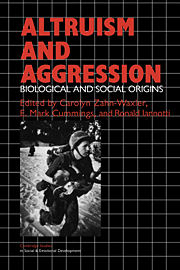Book contents
- Frontmatter
- Contents
- List of contributors
- Editorial preface
- Introduction: Altruism and aggression: problems and progress in research
- Part I Biological, sociobiological, and ethological approaches to the study of altruism and aggression
- Part II Development, socialization, and mediators of altruism and aggression in children
- Conclusions: lessons from the past and a look to the future
- Index of names
- Index of subjects
Editorial preface
Published online by Cambridge University Press: 04 August 2010
- Frontmatter
- Contents
- List of contributors
- Editorial preface
- Introduction: Altruism and aggression: problems and progress in research
- Part I Biological, sociobiological, and ethological approaches to the study of altruism and aggression
- Part II Development, socialization, and mediators of altruism and aggression in children
- Conclusions: lessons from the past and a look to the future
- Index of names
- Index of subjects
Summary
This book is the outcome of a conference held in 1982 at the National Institute of Mental Health, Bethesda, Maryland. It was funded by the Cotnmittee on Summer Institutes and Study Groups under the auspices of the Society for Research on Child Development and the Child Development Foundation. The purposes of the study groups have been (1) to organize existing scientific knowledge and (2) to define critical issues and strategies for future research on timely topics. In the Zeitgeist of the late 1970s and early 1980s, topics pertaining to socioemotional development in children have assumed special significance. Altruism and aggression are core features of both social and emotive systems in humans and infrahumans. Understanding of the etiologies and interconnections of altruism and aggression has remained elusive. They are topics that have vexed and fascinated philosophers, scientists, and other scholars over the centuries. Only recently have the tools and strategies of the biological, behavioral, and social sciences evolved to a degree of sophistication that might permit meaningful further advances in knowledge in these arenas.
The major aim of the workshop was to bring together an interdisciplinary group of scientists to discuss the interconnections of altruism and aggression within and across species. The focus was on the etiology of altruistic and aggressive behaviors in humans and nonhumans, from biological, ethological, and behavioral perspectives.
- Type
- Chapter
- Information
- Altruism and AggressionSocial and Biological Origins, pp. xi - xivPublisher: Cambridge University PressPrint publication year: 1986

